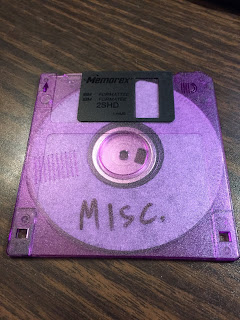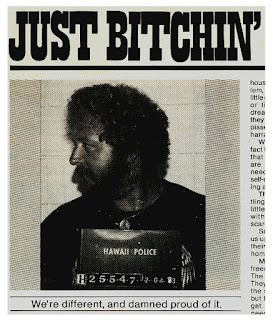c. 2018 Rod Ice
All rights reserved
(5-18)
Note
To Readers: I have been looking through old 1.44 MB diskettes in my
archives. This one seems to have come from my father as it contains
various articles including these cajun recipes by 'Dee' Gautreau.
PICKLE MEAT
(Creole Pickled Pork)
Pickled
pork, or "pickle meat", as it's called in New Orleans, is
what some folks consider the quintessential seasoning meat for red
beans and rice, as well as other bean dishes. Some folks use ham
hocks, some smoked ham, some even use tasso. But you'll find a
significant number of Creole mamas who'll tell you that it ain't red
beans without pickle meat. It's readily available at many New Orleans
markets, but you can make it yourself
2
pounds boneless pork butt, cut into 2-inch cubes
-
1 quart distilled white vinegar
-
1/2 cup mustard seed
-
1 tablespoon celery seed
-
2 tablespoons Tabasco sauce
-
1 bay leaf
-
6 cloves garlic, peeled and cracked (not smashed)
-
1 tablespoon kosher salt
-
12 peppercorns
Combine
everything except the pork in a non-reactive saucepan and boil for
three minutes. Cool and place in a refrigerator container (plastic,
glass or stainless-steel) and add the pork. Stir to remove bubbles.
Cover and refrigerate for three days.
CREOLE
HOT SAUSAGE
Grilled
or pan-fried on the side with red beans and rice, or on a po-boy, or
even (sparingly) in gumbo ... mmmmm, this stuff is great. And hot.
Add it to smothered vegetables, or use it as a breakfast sausage.
My
grandfather Joe Luquet used to make his own hot sausage for the meat
counter at Niedermeier's, the Bywater neighborhood grocery store he
and my grandmother Dot Luquet née Niedermeier used to run at the
corner of Mazant and Royal Streets. I was a little too young to
remember how he did it, but it was probably very much like this
excellent recipe.
-
4 pounds lean fresh pork
-
2 pounds pork fat
-
2 teaspoons finely minced garlic
-
2 tablespoons cayenne pepper
-
1 tablespoon freshly ground black pepper
-
2 tablespoons salt
-
1-1/2 teaspoons ground bay leaf
-
2 tablespoons paprika
-
1/2 teaspoon sugar
-
3 yards sausage casing (optional)
Grind
the pork and fatback to a medium to coarse grind, and mix well with
the other ingredients. Stuff into sausage casings, and tie them off
so that each sausage is about six inches long. You can omit this step
and make sausage patties if you like.
Fresh
sausage should be used quickly, and will keep in the refrigerator for
three days. You can also freeze it for up to three months.
1978
WORLD CHAMPIONSHIP
CHICKEN JAMBALAYA
CHICKEN JAMBALAYA
Here's
an award-winning recipe (along with some tips and some history of the
dish) as prepared by: Matthew "Dee" Gautreau, Dee
Gautreau's Cajun Catering, Gonzales, Louisiana 70737, Telephone -
(504) 644-5977 or 644-4405.
This makes damn good jambalaya, and is a brown-style rather than the red tomato-based jambalayas you see in New Orleans (like mine for instance). This one doesn't use a chicken stock because you make your own as you go along here.
This makes damn good jambalaya, and is a brown-style rather than the red tomato-based jambalayas you see in New Orleans (like mine for instance). This one doesn't use a chicken stock because you make your own as you go along here.
-
One 3 to 4 pound hen cut into serving pieces
-
3 cups long grain rice - uncooked
-
1/4 cup cooking oil
-
3 medium white onions - chopped fine
-
6 cups water (but Chuck says use chicken stock if you want it to be really good)
-
1 tablespoon salt, or to taste
-
2-1/2 teaspoons granulated garlic
-
1 cup green onions - chopped
-
1/2 cup green peppers
-
1/2 cup celery - chopped fine
-
1/4 teaspoon black pepper
-
Red pepper to taste
-
2 tablespoons Louisiana hot sauce
Fry
chicken in cooking oil until golden brown. Remove chicken and oil
leaving just enough oil to cover bottom of pot. Add onions, and fry
until golden brown. Put chicken back into pot with onions, and add 6
cups of water (note water level). Add remaining seasoning and simmer
covered until chicken is tender. If necessary, add enough water to
bring back to previous level. Bring back to a rolling boil, and add
rice. Simmer uncovered for about 15 minutes - turn rice. Cover with
tight fitting lid, let steam for 15 minutes, or until rice is tender.
Turn rice once more, and turn fire off. Let stand for 10 minutes and
then serve.
Jambalaya
is more tasty if highly seasoned, so don't forget the red pepper.
When adding salt, water should taste a little too salty, as rice
absorbs considerable salt.
Yield:
6 to 8 generous servings.
HELPFUL
HINTS FOR
INEXPERIENCED JAMBALAYA COOKS:
INEXPERIENCED JAMBALAYA COOKS:
Most
jambalaya cooks prefer to cook in cast iron pots - whether cast iron
or aluminum pot is used, it should be heavy enough to prevent easy
burning, and have a tight lid.
To brown onions:
Onions and shortening are put into the pot, covered, and cooked over low heat until golden brown, stirring frequently. A little water added to the onions will help prevent sticking.
Jambalaya should never be stirred - turn rather than stir after the rice has been added. This prevents the grains of rice from breaking up. Most cooks turn jambalaya only two or three times after the rice is added, being sure to scoop from the bottom of the pot to mix rice evenly with other ingredients.
To brown onions:
Onions and shortening are put into the pot, covered, and cooked over low heat until golden brown, stirring frequently. A little water added to the onions will help prevent sticking.
Jambalaya should never be stirred - turn rather than stir after the rice has been added. This prevents the grains of rice from breaking up. Most cooks turn jambalaya only two or three times after the rice is added, being sure to scoop from the bottom of the pot to mix rice evenly with other ingredients.
A
LITTLE JAMBALAYA HISTORY
Similar
in many ways to Spanish paella, the term "jambalaya" is
derived from the Spanish jamón for ham. Jambalaya found its way into
Creole cookery in the late 1700's where it soon took on the flavor of
added local ingredients.
It can be made (separately or all together) with ham, chicken, sausage, fresh pork, shrimp and oysters, to which is added shortening, rice, onion, garlic, pepper and other seasonings.
Starting with church fairs, which were the largest public gatherings at the turn of the century, Jambalaya emerged from small quantity indoor cooking to become the ideal dish for outdoor cooking over hardwood fire. Big black cast iron pots made preparation so easy and economical for church use that Jambalaya was rapidly adapted for political rallies, weddings, family reunions and other affairs. No fair or political rally around Gonzales is complete without Jambalaya cooking.
The Jambalaya Festival and World Champion Jambalaya Cooking contest is held annually at Gonzales and attracts area cooks who have spent years perfecting the are of cooking and seasoning this Creole delicacy. Gonzales really is the Jambalaya Capital of The World.
It can be made (separately or all together) with ham, chicken, sausage, fresh pork, shrimp and oysters, to which is added shortening, rice, onion, garlic, pepper and other seasonings.
Starting with church fairs, which were the largest public gatherings at the turn of the century, Jambalaya emerged from small quantity indoor cooking to become the ideal dish for outdoor cooking over hardwood fire. Big black cast iron pots made preparation so easy and economical for church use that Jambalaya was rapidly adapted for political rallies, weddings, family reunions and other affairs. No fair or political rally around Gonzales is complete without Jambalaya cooking.
The Jambalaya Festival and World Champion Jambalaya Cooking contest is held annually at Gonzales and attracts area cooks who have spent years perfecting the are of cooking and seasoning this Creole delicacy. Gonzales really is the Jambalaya Capital of The World.
About
the creator of the championship recipe:
"Dee"
Gautreau is a World Champion Jambalaya cook; he won the title in
1978. He has his own catering business, "Dee Gautreau's Cajun
Catering." In the past nine years he has cooked Jambalaya all
over the United States and in France, too.
Comments or questions about 'Words On The
Loose' may be sent to: icewritesforyou@gmail.com
Write us at: P. O. Box 365 Chardon, OH 44024











